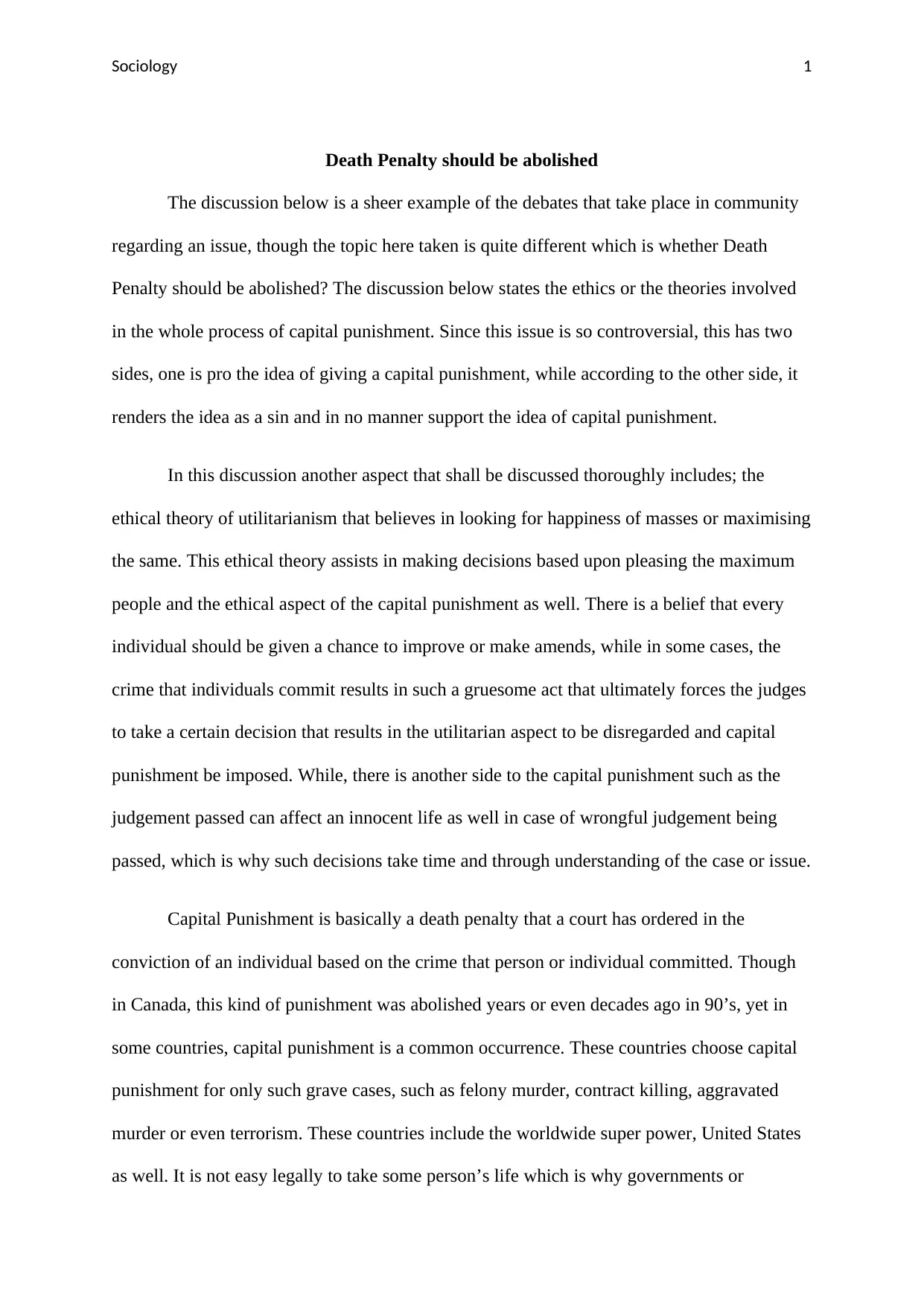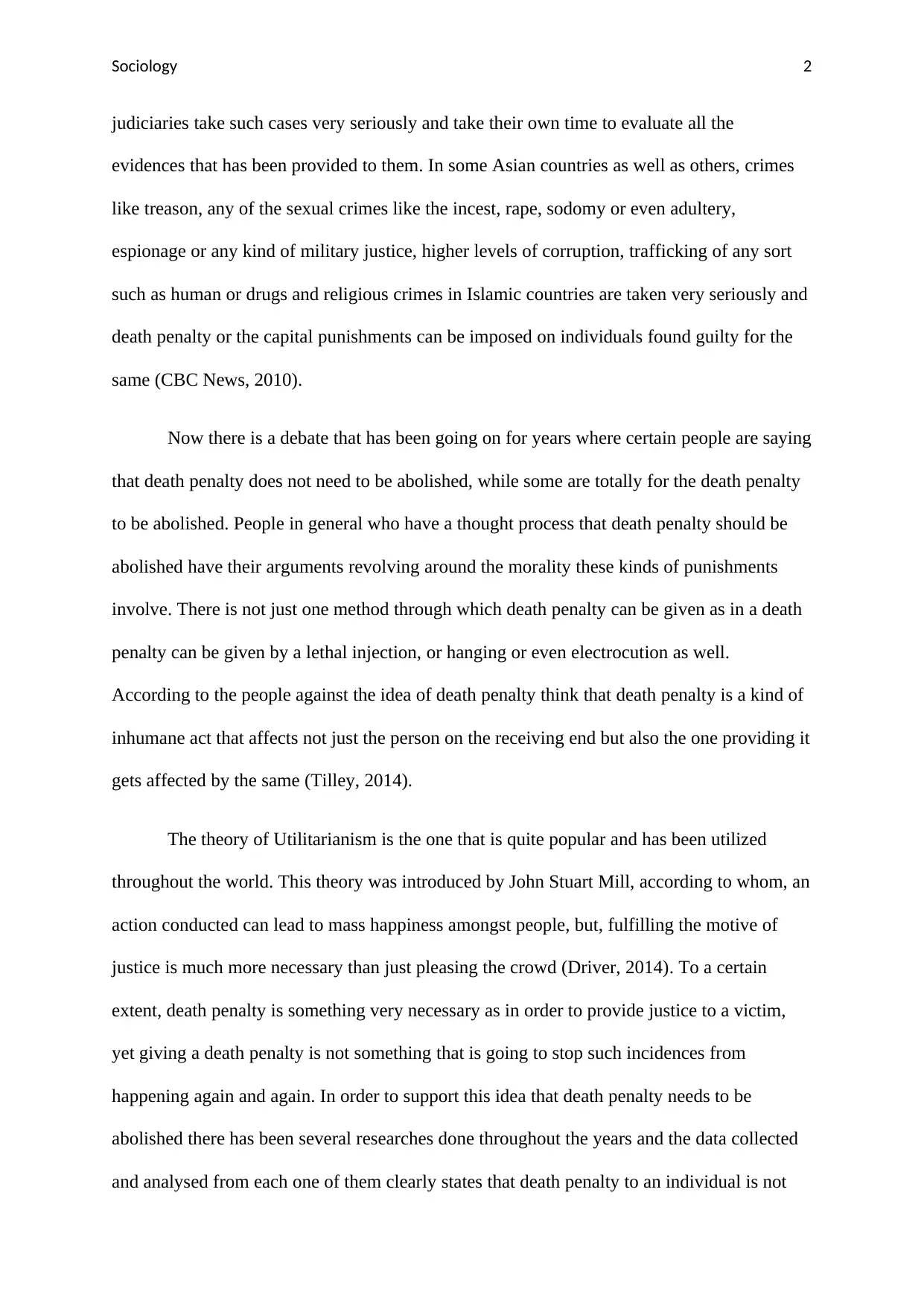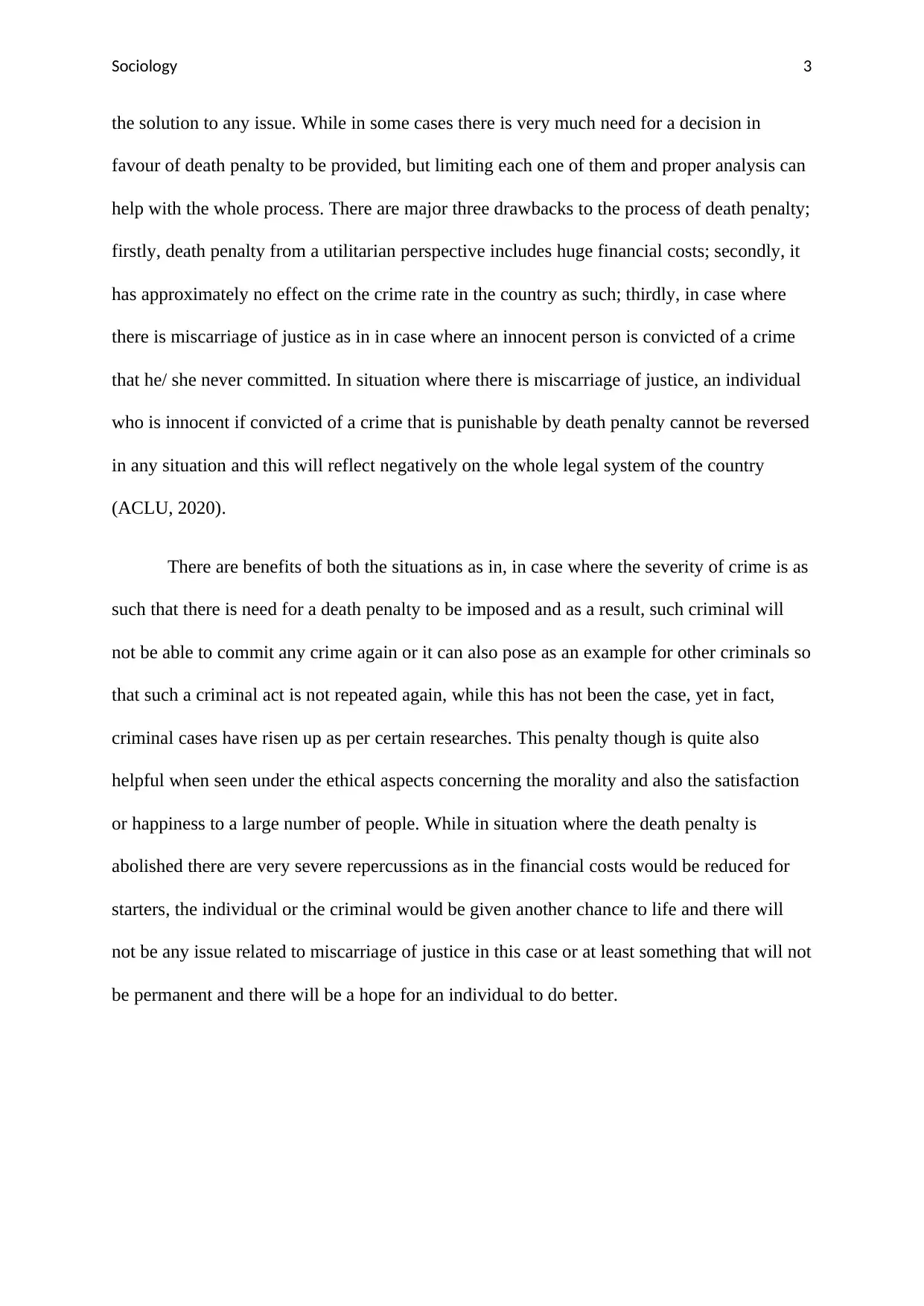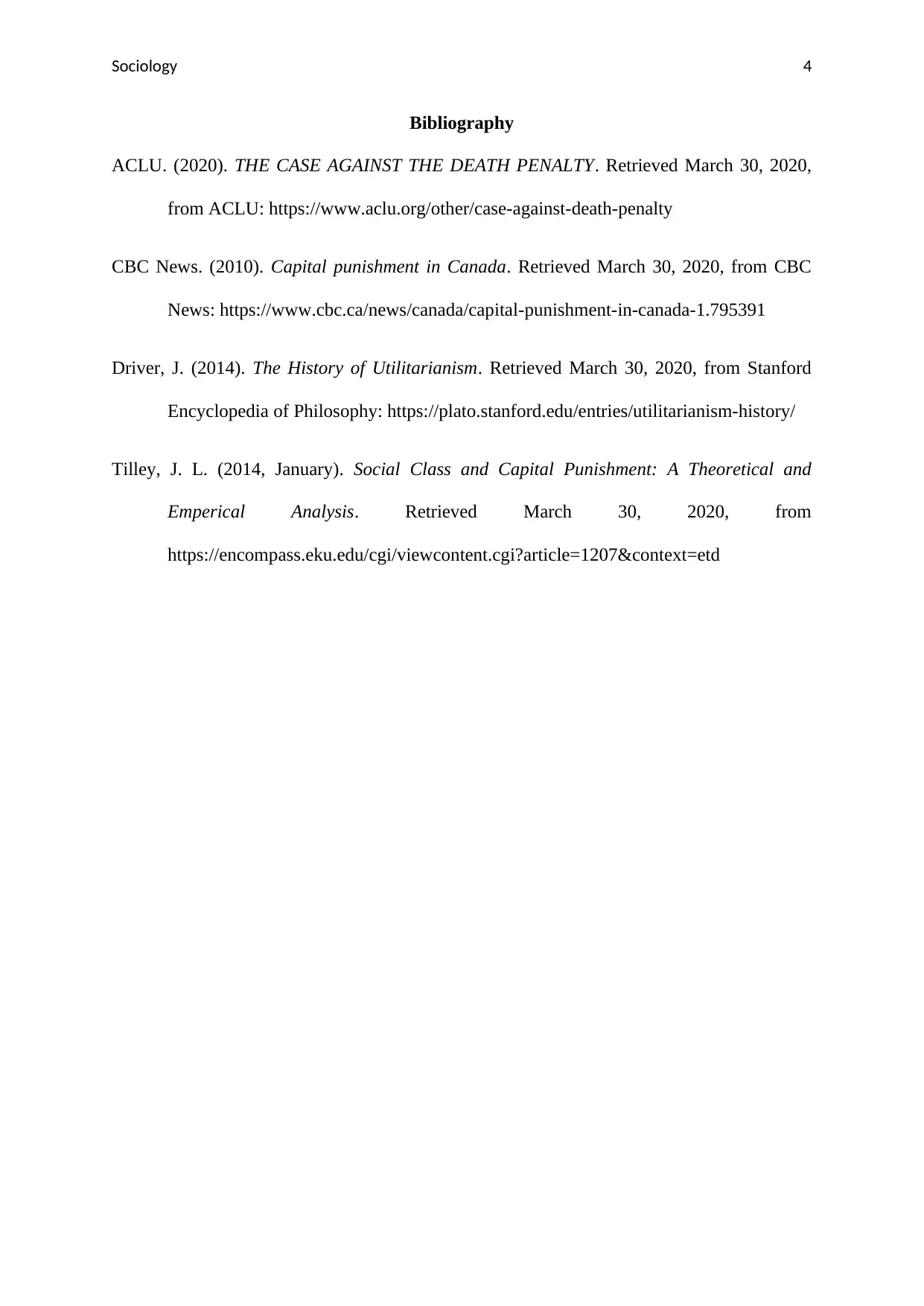University Sociology: Ethical Issue - Death Penalty Analysis
VerifiedAdded on 2022/09/05
|5
|1273
|20
Case Study
AI Summary
This sociology assignment presents an ethical analysis of the death penalty, arguing for its abolition. The student utilizes utilitarianism and other ethical theories to examine the morality of capital punishment. The paper discusses the historical context of the death penalty, its legal aspects, and the methods of execution. It explores arguments for and against capital punishment, addressing the potential for wrongful convictions, financial costs, and the impact on crime rates. The assignment concludes by advocating for abolition, emphasizing the possibility of rehabilitation and the reduction of financial burdens associated with the death penalty, while also arguing that there is no evidence to support the notion that the death penalty deters crime. The student also acknowledges the emotional aspect of the death penalty, and the need to provide justice to the victim of crimes.

University
Ethical Issue
Death Penalty should be Abolished
Student Credentials
3/30/2020
Ethical Issue
Death Penalty should be Abolished
Student Credentials
3/30/2020
Paraphrase This Document
Need a fresh take? Get an instant paraphrase of this document with our AI Paraphraser

Sociology 1
Death Penalty should be abolished
The discussion below is a sheer example of the debates that take place in community
regarding an issue, though the topic here taken is quite different which is whether Death
Penalty should be abolished? The discussion below states the ethics or the theories involved
in the whole process of capital punishment. Since this issue is so controversial, this has two
sides, one is pro the idea of giving a capital punishment, while according to the other side, it
renders the idea as a sin and in no manner support the idea of capital punishment.
In this discussion another aspect that shall be discussed thoroughly includes; the
ethical theory of utilitarianism that believes in looking for happiness of masses or maximising
the same. This ethical theory assists in making decisions based upon pleasing the maximum
people and the ethical aspect of the capital punishment as well. There is a belief that every
individual should be given a chance to improve or make amends, while in some cases, the
crime that individuals commit results in such a gruesome act that ultimately forces the judges
to take a certain decision that results in the utilitarian aspect to be disregarded and capital
punishment be imposed. While, there is another side to the capital punishment such as the
judgement passed can affect an innocent life as well in case of wrongful judgement being
passed, which is why such decisions take time and through understanding of the case or issue.
Capital Punishment is basically a death penalty that a court has ordered in the
conviction of an individual based on the crime that person or individual committed. Though
in Canada, this kind of punishment was abolished years or even decades ago in 90’s, yet in
some countries, capital punishment is a common occurrence. These countries choose capital
punishment for only such grave cases, such as felony murder, contract killing, aggravated
murder or even terrorism. These countries include the worldwide super power, United States
as well. It is not easy legally to take some person’s life which is why governments or
Death Penalty should be abolished
The discussion below is a sheer example of the debates that take place in community
regarding an issue, though the topic here taken is quite different which is whether Death
Penalty should be abolished? The discussion below states the ethics or the theories involved
in the whole process of capital punishment. Since this issue is so controversial, this has two
sides, one is pro the idea of giving a capital punishment, while according to the other side, it
renders the idea as a sin and in no manner support the idea of capital punishment.
In this discussion another aspect that shall be discussed thoroughly includes; the
ethical theory of utilitarianism that believes in looking for happiness of masses or maximising
the same. This ethical theory assists in making decisions based upon pleasing the maximum
people and the ethical aspect of the capital punishment as well. There is a belief that every
individual should be given a chance to improve or make amends, while in some cases, the
crime that individuals commit results in such a gruesome act that ultimately forces the judges
to take a certain decision that results in the utilitarian aspect to be disregarded and capital
punishment be imposed. While, there is another side to the capital punishment such as the
judgement passed can affect an innocent life as well in case of wrongful judgement being
passed, which is why such decisions take time and through understanding of the case or issue.
Capital Punishment is basically a death penalty that a court has ordered in the
conviction of an individual based on the crime that person or individual committed. Though
in Canada, this kind of punishment was abolished years or even decades ago in 90’s, yet in
some countries, capital punishment is a common occurrence. These countries choose capital
punishment for only such grave cases, such as felony murder, contract killing, aggravated
murder or even terrorism. These countries include the worldwide super power, United States
as well. It is not easy legally to take some person’s life which is why governments or

Sociology 2
judiciaries take such cases very seriously and take their own time to evaluate all the
evidences that has been provided to them. In some Asian countries as well as others, crimes
like treason, any of the sexual crimes like the incest, rape, sodomy or even adultery,
espionage or any kind of military justice, higher levels of corruption, trafficking of any sort
such as human or drugs and religious crimes in Islamic countries are taken very seriously and
death penalty or the capital punishments can be imposed on individuals found guilty for the
same (CBC News, 2010).
Now there is a debate that has been going on for years where certain people are saying
that death penalty does not need to be abolished, while some are totally for the death penalty
to be abolished. People in general who have a thought process that death penalty should be
abolished have their arguments revolving around the morality these kinds of punishments
involve. There is not just one method through which death penalty can be given as in a death
penalty can be given by a lethal injection, or hanging or even electrocution as well.
According to the people against the idea of death penalty think that death penalty is a kind of
inhumane act that affects not just the person on the receiving end but also the one providing it
gets affected by the same (Tilley, 2014).
The theory of Utilitarianism is the one that is quite popular and has been utilized
throughout the world. This theory was introduced by John Stuart Mill, according to whom, an
action conducted can lead to mass happiness amongst people, but, fulfilling the motive of
justice is much more necessary than just pleasing the crowd (Driver, 2014). To a certain
extent, death penalty is something very necessary as in order to provide justice to a victim,
yet giving a death penalty is not something that is going to stop such incidences from
happening again and again. In order to support this idea that death penalty needs to be
abolished there has been several researches done throughout the years and the data collected
and analysed from each one of them clearly states that death penalty to an individual is not
judiciaries take such cases very seriously and take their own time to evaluate all the
evidences that has been provided to them. In some Asian countries as well as others, crimes
like treason, any of the sexual crimes like the incest, rape, sodomy or even adultery,
espionage or any kind of military justice, higher levels of corruption, trafficking of any sort
such as human or drugs and religious crimes in Islamic countries are taken very seriously and
death penalty or the capital punishments can be imposed on individuals found guilty for the
same (CBC News, 2010).
Now there is a debate that has been going on for years where certain people are saying
that death penalty does not need to be abolished, while some are totally for the death penalty
to be abolished. People in general who have a thought process that death penalty should be
abolished have their arguments revolving around the morality these kinds of punishments
involve. There is not just one method through which death penalty can be given as in a death
penalty can be given by a lethal injection, or hanging or even electrocution as well.
According to the people against the idea of death penalty think that death penalty is a kind of
inhumane act that affects not just the person on the receiving end but also the one providing it
gets affected by the same (Tilley, 2014).
The theory of Utilitarianism is the one that is quite popular and has been utilized
throughout the world. This theory was introduced by John Stuart Mill, according to whom, an
action conducted can lead to mass happiness amongst people, but, fulfilling the motive of
justice is much more necessary than just pleasing the crowd (Driver, 2014). To a certain
extent, death penalty is something very necessary as in order to provide justice to a victim,
yet giving a death penalty is not something that is going to stop such incidences from
happening again and again. In order to support this idea that death penalty needs to be
abolished there has been several researches done throughout the years and the data collected
and analysed from each one of them clearly states that death penalty to an individual is not
⊘ This is a preview!⊘
Do you want full access?
Subscribe today to unlock all pages.

Trusted by 1+ million students worldwide

Sociology 3
the solution to any issue. While in some cases there is very much need for a decision in
favour of death penalty to be provided, but limiting each one of them and proper analysis can
help with the whole process. There are major three drawbacks to the process of death penalty;
firstly, death penalty from a utilitarian perspective includes huge financial costs; secondly, it
has approximately no effect on the crime rate in the country as such; thirdly, in case where
there is miscarriage of justice as in in case where an innocent person is convicted of a crime
that he/ she never committed. In situation where there is miscarriage of justice, an individual
who is innocent if convicted of a crime that is punishable by death penalty cannot be reversed
in any situation and this will reflect negatively on the whole legal system of the country
(ACLU, 2020).
There are benefits of both the situations as in, in case where the severity of crime is as
such that there is need for a death penalty to be imposed and as a result, such criminal will
not be able to commit any crime again or it can also pose as an example for other criminals so
that such a criminal act is not repeated again, while this has not been the case, yet in fact,
criminal cases have risen up as per certain researches. This penalty though is quite also
helpful when seen under the ethical aspects concerning the morality and also the satisfaction
or happiness to a large number of people. While in situation where the death penalty is
abolished there are very severe repercussions as in the financial costs would be reduced for
starters, the individual or the criminal would be given another chance to life and there will
not be any issue related to miscarriage of justice in this case or at least something that will not
be permanent and there will be a hope for an individual to do better.
the solution to any issue. While in some cases there is very much need for a decision in
favour of death penalty to be provided, but limiting each one of them and proper analysis can
help with the whole process. There are major three drawbacks to the process of death penalty;
firstly, death penalty from a utilitarian perspective includes huge financial costs; secondly, it
has approximately no effect on the crime rate in the country as such; thirdly, in case where
there is miscarriage of justice as in in case where an innocent person is convicted of a crime
that he/ she never committed. In situation where there is miscarriage of justice, an individual
who is innocent if convicted of a crime that is punishable by death penalty cannot be reversed
in any situation and this will reflect negatively on the whole legal system of the country
(ACLU, 2020).
There are benefits of both the situations as in, in case where the severity of crime is as
such that there is need for a death penalty to be imposed and as a result, such criminal will
not be able to commit any crime again or it can also pose as an example for other criminals so
that such a criminal act is not repeated again, while this has not been the case, yet in fact,
criminal cases have risen up as per certain researches. This penalty though is quite also
helpful when seen under the ethical aspects concerning the morality and also the satisfaction
or happiness to a large number of people. While in situation where the death penalty is
abolished there are very severe repercussions as in the financial costs would be reduced for
starters, the individual or the criminal would be given another chance to life and there will
not be any issue related to miscarriage of justice in this case or at least something that will not
be permanent and there will be a hope for an individual to do better.
Paraphrase This Document
Need a fresh take? Get an instant paraphrase of this document with our AI Paraphraser

Sociology 4
Bibliography
ACLU. (2020). THE CASE AGAINST THE DEATH PENALTY. Retrieved March 30, 2020,
from ACLU: https://www.aclu.org/other/case-against-death-penalty
CBC News. (2010). Capital punishment in Canada. Retrieved March 30, 2020, from CBC
News: https://www.cbc.ca/news/canada/capital-punishment-in-canada-1.795391
Driver, J. (2014). The History of Utilitarianism. Retrieved March 30, 2020, from Stanford
Encyclopedia of Philosophy: https://plato.stanford.edu/entries/utilitarianism-history/
Tilley, J. L. (2014, January). Social Class and Capital Punishment: A Theoretical and
Emperical Analysis. Retrieved March 30, 2020, from
https://encompass.eku.edu/cgi/viewcontent.cgi?article=1207&context=etd
Bibliography
ACLU. (2020). THE CASE AGAINST THE DEATH PENALTY. Retrieved March 30, 2020,
from ACLU: https://www.aclu.org/other/case-against-death-penalty
CBC News. (2010). Capital punishment in Canada. Retrieved March 30, 2020, from CBC
News: https://www.cbc.ca/news/canada/capital-punishment-in-canada-1.795391
Driver, J. (2014). The History of Utilitarianism. Retrieved March 30, 2020, from Stanford
Encyclopedia of Philosophy: https://plato.stanford.edu/entries/utilitarianism-history/
Tilley, J. L. (2014, January). Social Class and Capital Punishment: A Theoretical and
Emperical Analysis. Retrieved March 30, 2020, from
https://encompass.eku.edu/cgi/viewcontent.cgi?article=1207&context=etd
1 out of 5
Related Documents
Your All-in-One AI-Powered Toolkit for Academic Success.
+13062052269
info@desklib.com
Available 24*7 on WhatsApp / Email
![[object Object]](/_next/static/media/star-bottom.7253800d.svg)
Unlock your academic potential
Copyright © 2020–2026 A2Z Services. All Rights Reserved. Developed and managed by ZUCOL.





